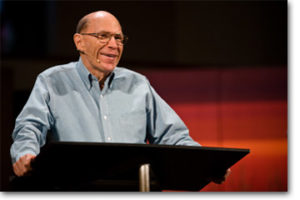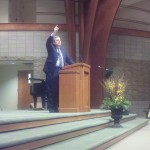 Article “Our Battle with Sin” by Pastor Steve Weaver (original source here)
Article “Our Battle with Sin” by Pastor Steve Weaver (original source here)
Chapter XIII, Paragraph 3 of the Second London Confession: “Of Sanctification”
Over the Christmas holidays, I have been fighting an ongoing battle to recover my home study. For the past two years it has collected all the extra tools, home repair items, and especially stacks of books, papers, and periodicals. At times it has seemed like a losing battle. Storage bins were purchased, bags of trash have been carried off, periodicals and books have been organized and shelved. At present only a couple of stacks of loose papers remain in my study’s floor. It is very encouraging, but the vestiges of the struggle remain. I know that the battle to keep my study usable will be a lifelong struggle. There has been progress, but more work needs to be done and new battles will need to be fought daily.
Likewise, the battle for holiness is a lifelong battle. The believer’s sanctification progresses surely, but slowly. Paragraph 3 of chapter 13 of the Confession begins with a reference to war. The war spoken of is the “continual and irreconcilable war” between the flesh and the Spirit mentioned in paragraph 2 of the same chapter.
In this war, the remaining corruption may greatly prevail for a time. Yet through the continual supply of strength from the sanctifying Spirit of Christ, the regenerate part overcomes. So the saints grow in grace, perfecting holiness in the fear of God. They pursue a heavenly life, in gospel obedience to all the commands that Christ as Head and King has given them in his Word.1
Spirit or spirit?
In the first paragraph of this chapter, both the regenerate believer’s “new spirit” and the Holy Spirit are mentioned. At the end of paragraph 2, language from the Authorized Version of Galatians 5:17 is used of the conflict between the flesh and the Holy Spirit. However, listed along with the Galatians 5:17 prooftext is 1 Peter 2:11 where believers are called upon “to abstain from the passions of the flesh, which wage war against your soul.” The latter passage is clearly noting the conflict between our fleshly desires and our human souls.
The dual reference creates some confusion when moving to paragraph 3 and its opening mention of “this war” in which, we are told, “the remaining corruption may greatly prevail for a time.” The careful reader may ask, “What? The corruption of the flesh prevail over the Holy Spirit?” Then we realize that a shift has taken place in the confession to the struggle between the flesh and the regenerated human spirit. It is over the human spirit, although redeemed, that the flesh temporarily prevails.
The War and Persecution
In the battle between the flesh and the Spirit, the flesh may appear to prevail, and according to the confession, may actually do so “for a time.” In Romans 7:23, the Apostle Paul declares, “but I see in my members another law waging war against the law of my mind and making me captive to the law of sin that dwells in my members.” Although some today may differ in their interpretation of this passage, the framers of the confession understood Paul here to be referring to his own experience as a Christian struggling with sin. They used this verse as a prooftext for the believer’s struggle with sin. Christians face a lifelong struggle between their redeemed spirits and their not-yet-redeemed bodies.
Seventeenth-century Baptists knew what it was to experience long physical struggles in their periodic bouts with persecution by the state. London Baptist pastor Hercules Collins (1647–1702) was one of the original signatories of the Second London Confession when it was approved by the General Assembly in 1689.2 His long pastoral ministry at the Wapping Church (1677–1702) was punctuated by periods of persecution. In an imprisonment in 1684, Collins wrote to his church in a work titled A Voice from Prison. In this printed sermon, he urged his congregation to prepare themselves to endure persecution by practicing the mortification of their sins. “Let not that Man think to wear the Cross of Persecution, that doth not first wear the Cross of Mortification.”3 Collins went on to say,
We should inure our selves to wear the Publick Cross, by wearing it first more privately in our Houses, in our Families, in our Shops and Trades: For let not that Person think he will ever be able to part with his Houses, Lands, Liberties, for the Lord Jesus Christ, that cannot first part with a secret lust: But if we have Grace enough, to wear daily the Cross of Mortification of the old Man; you need not fear but he that giveth Grace to do the greater, will give Grace to doe the lesser; for I look upon the subduing of Corruption, a greater thing then enduring Persecution; though neither can be done as it ought, without help from Heaven.4
Those who, by the grace of God, were regularly putting to death their sins would experience an easier path in enduring physical persecution. Thus, Collins was encouraging personal holiness as the best means to prepare for persecution for the cause of Christ. Without this spiritual practice, professing believers would not be able to withstand the temptation to deny Christ in the face of persecution.
Collins closed his prison epistle with a series of prayers to God. In the first petition, Collins asked that God would purge the church of its impurities which he saw as a cause for their persecution. “God is contending with us,” Collins warned. Therefore, he urged his church to purify, not only their churches, but also their own hearts. “Let us all Banish and Expel the Achan out of our Hearts, out of our Churches, and shew our selves Zealous against Sin.”5 Collins believed God was using persecution to drive believers to fight against their own sin in the continual war between the flesh and the spirit.
Winning the War
Despite the seemingly unending quagmire, the “regenerate part” (redeemed soul) will ultimate overcome due to the empowering presence of the Holy Spirit who is at work within us to sanctify us. For this confidence, the framers pointed to Romans 6:14, which says, “For sin will have no dominion over you, since you are not under law but under grace.” The conquering of sin comes “through the continual supply of strength from the sanctifying Spirit of Christ.” Here the distinction between our redeemed human spirit and the Holy Spirit becomes clear. It is the Holy Spirt who enables our spirit to overcome the flesh. The Spirit is described by the adjective “Sanctifying” as opposed to the more common “Holy.” In other words, the Spirit who is Holy is in the business of making men holy. It is only by the work of the Spirit that any victories over sin and the flesh are achieved.
From this point onward, this paragraph of the confession strikes a more encouraging note. Now, believers are addressed as “Saints” who are growing in grace and “perfecting holiness in the fear of God.” Although the modern English edition cited in this article has moved the scriptural proofs of Ephesians 4:15–16, 2 Corinthians 3:18 and 7:1 to the end of the paragraph, they were originally placed here in the original 1677 edition.6 This placement is confirmed by a comparison of the text of the Second London Confession with one of its source documents—the Westminster Confession of Faith.7 The Westminster Confession ended its chapter on sanctification with the phrase “fear of God” and included all three of the prooftexts. Ephesians 4:15–16, which speaks of believers growing up, illumines the phrase “the saints grow in grace.” 2 Corinthians 3:18, which speaks of “beholding the glory of the Lord” and “being transformed into the same image from one degree of glory to another,” explains the phase “perfecting holiness.” 2 Corinthians 7:1, which commands believers to “let us cleanse ourselves from every defilement of body and spirit, bringing holiness to completion in the fear of God,” expands upon the idea of “perfecting holiness in the fear of God,” using the exact same language found in the Authorized Version.
As is well-known to the readers of this publication, the Second London Confession is a Baptist adaptation of the work of the Westminster Assembly in their confession of faith first published in 1647. Lesser known is that whenever the Second London Confession deviates from the wording of the Westminster divines, it follows the Savoy Declaration (1658) of the Congregationalists, which is itself a modification of the Westminster Confession. Perhaps even lesser known is that on occasion the framers of the Second London Confession would utilize the language of the First London Confession to emphasize their Baptist distinctives or to elaborate upon some topic. The Second London adds the wording from the latter part of the article on sanctification in the First London Confession to the original language of the Westminster/Savoy confessions.8
The topic of sanctification is addressed in chapter 29 of the First London Confession. The chapter in its entirety states:
All believers are a holy and sanctified people, and that sanctification is a spiritual grace of the new covenant, and an effect of the love of God manifested in the soul, whereby the believer presseth after a heavenly and evangelical obedience to all the commands, which Christ as head and king in His new covenant hath prescribed to them.9
Beginning with the word “presseth,” the Second London follows the language of the First London fairly closely in their seventeenth-century editions, the only substantial change being the exchange of “Word” for “new covenant.”10 The additional language makes clear that genuine believers are interested in growing in holiness. They are not merely passive in the process of sanctification. The language of “pressing,” “obedience,” and “commands” reminds believers of their responsibility to “work out” their own salvation as God “works in” them (Philippians 2:12–13).
All this was to be done in submission to the authority of Christ as king and His precepts contained in the written Word. These Baptists built their churches upon the idea of the regulative principle of worship, which declared that God alone in His Word has the authority to determine how He is worshiped. The language from the end of the chapter on sanctification requiring “obedience to all the commands that Christ as Head and King has given them in His Word” seems very familiar. This was exactly the language used to defend their ecclesiastical distinctive of believer’s baptism by immersion. Their interest in the authority of Scripture and Christ as law-giver, however, was not merely ecclesiological, but also had direct personal application. In other words, they were not only interested in the church obeying the commands of Christ corporately regarding the ordinances, specifically the immersion of believers; they also held to the lordship of Christ over the individual lives of His people. Christ requires that His people walk and grow in holiness. Growing in holiness was no more optional for the individual believer than following Christ’s example in being immersed as a professing believer.
Conclusion: A Gospel Obedience
The obedience to the commands of Christ, while expected of believers, were not seen as a means of justification. Instead, this obedience is a “gospel obedience” that flows out into believers’ lives as a result of faith in the gospel. Chapter 11 of the Second London makes clear that even this “gospel obedience” is not the means of justification. Believers are justified “for Christ’s sake alone and not for anything produced in them or done by them.” The confession goes on to say that Christ
does not impute faith itself, the act of believing, or any other gospel obedience to them as their righteousness. Instead, He imputes Christ’s active obedience to the whole law and passive obedience in His death as their whole and only righteousness by faith.
In his final work published in the final year of his life, Hercules Collins demonstrated how those who first embraced the confession lived out the tension between relying on Christ’s righteousness and the biblical commands to pursue holiness. Believers, he said, “ought to live so holily as if we were to be saved by our living, and yet when we have done all, to rely upon Christ and his righteousness.”11
NOTES:
1 Stan Reeves, ed., The 1689 Baptist Confession of Faith in Modern English (Cape Coral, FL: Founders Press, 2017), 31–32. Citations of the confession in the remainder of this article will come from this edition. Scripture references are from the English Standard Version (ESV).
2 For details on the life and theology of Hercules Collins, see G. Stephen Weaver, Jr., Orthodox, Puritan, Baptist: Hercules Collins (1647—1702) and Particular Baptist Identity in Early Modern England (Göttingen, Germany: Vandenhoeck & Ruprecht, 2015).
3 Hercules Collins, A Voice from the Prison, Or, Meditations on Revelations III.XI. Tending To the Establishment of Gods Little Flock, In an Hour of Temptation (London, 1684), 30. Spelling and capitalization in original.
4 Collins, A Voice from the Prison, 30.
5 Ibid., 32.
6 See A Confession of Faith: Put forth by the Elders and Brethren of Many Congregations of Christians (baptized upon Profession of their Faith) in London and the Country (London: Benjamin Harris, 1677), 46.
7 An excellent resource for comparing the major seventeenth-century Particular Baptist confessions and catechisms with their source documents has been provided in James M. Renihan, ed., True Confessions: Baptist Documents in the Reformed Family (Palmdale, CA: Reformed Baptist Academic Press, 2004).
8 The language used by the framers of the Second London Confession comes from the second edition of the First London Confession published in 1646. The first edition had been published in 1644. A Confession of Faith of seven Congregations or Churches of Christ in London, which are commonly (but unjustly) called Anabaptists (London: Matth. Simmons, 1646).
9 Renihan, True Confessions, 116–17.
10 The modern English edition begins this section with “They pursue….”
11 Hercules Collins, The Temple Repair’d: Or, An Essay to Revive the Long-Neglected Ordinances, of Exercising the Spiritual Gift of Prophecy for the Edification of the Churches; and of Ordaining Ministers Duly Qualified (London: William and Joseph Marshal, 1702), 36–37.
 Article by John Hendryx (original source here)
Article by John Hendryx (original source here)

 Article by Jerry Bridges: Does Holiness Come By Striving After it or By Resting in God?
Article by Jerry Bridges: Does Holiness Come By Striving After it or By Resting in God?

